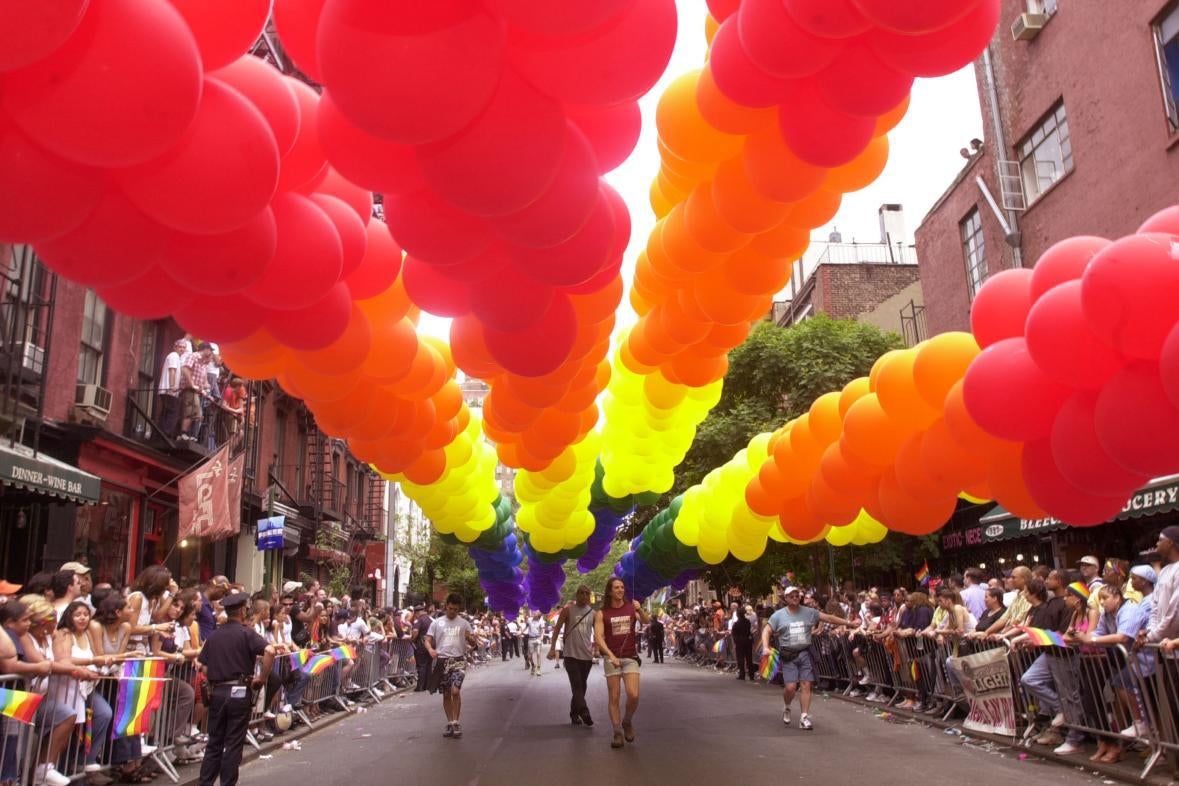My first Pride experience is etched in my memory like a vibrant, Technicolor dream. I mean, who could forget thousands of nipples making their way down Manhattan’s Fifth Avenue? I was 17 and fresh out of the closet. I had formed my first queer clique, an eclectic group of Latina, black, and white dykes and trans kids with spiky hair and attitudes. It was the late ’90s and there was defiance in the air. The girls of the Clit Club and ACT UP were alive and well, and Matthew Shepard’s death was a gaping wound that still hadn’t healed.
My friends convinced me to accompany them to the New York City Dyke March. I had no idea what to expect. I stood on the sidewalk near the route’s end point at Washington Square Park until the traffic quieted and the distant sound of whistles turned into a loud chant, and a wall of women walked in unison—and without shirts on—right down the middle of the street. Thousands of topless women of all shapes and sizes, a garden variety of exposed breasts and bellies. I shivered despite the warm temperature, because to see myself reflected in so many women was to know that I was where I was meant to be. For the first time, I felt part of a community—one that was incredibly powerful and beautiful. I would have cried if I hadn’t been an adolescent acutely aware that doing so would mean losing my street cred.
I followed my more seasoned friends into the park after the march ended and watched with fascination as the topless lesbians formed drum circles and danced with abandon to the beat. Someone dressed in a giant vagina costume was handing out lube and dental dams. Another woman wearing nothing but a rainbow ribbon in her hair was preaching about liberation.
Needless to say, the day tore the hinges off any reservations I had about who I was or what I was getting myself into.
As if that weren’t mind-expanding enough, the next day I joined my friends at the official New York City Pride Parade. Where the Dyke March had been radical, untethered, and technically illegal, the Pride Parade was orchestrated and organized, but it was equally outrageous. There were hundreds of thousands of people lined all along the streets from Midtown to the West Village. I stood sweating in the summer heat, wedged between shrieking gay men and dykes waving their arms, happy to be surrounded by an enormous crowd of people who had at one point felt alone and targeted, but today felt powerful together.
I watched and participated in various Pride events over the years, coordinating floats and corralling queers, marketing and promoting Pride parties, dancing and singing, marching while carrying signs and chanting slogans, printing T-shirts and helping reporters shape their stories. And sometimes I just stood on the sidelines drinking it all in. I noted how each year the crowds grew a little bit larger, how more floats boasted the logos of corporate sponsors, and more LGBTQ-affirming churches and elected officials joined in the fun.
Eventually, I felt I didn’t need to go to Pride anymore. Perhaps the movement had become too coopted by the mainstream for the drag queen glitter to shine brighter than the lights from the Citibank or American Airlines floats. Perhaps enough of the crowd had become acquiescent and felt we had won our rights that the political fervor I felt that first year had trailed off into mainstreamed living. I stopped going to Pride, because it felt different.
Then Orlando happened. Young queers who didn’t live through Matthew Shepard, whose schools had Gay Straight Alliances, and who didn’t know a time before the internet felt truly shaken. Older queers who had designed their lives around marriage and kids and white picket fences also paused to take stock. And our allies stopped wondering why we were still fighting for equal rights in the courts and legislatures when we had already won marriage, so why not just hush already.
For the first time since I came out, I feel the anger rising in the throats of queers and those who love us, a realization that it’s not over yet, that perhaps we’ve only just begun. For the first time since I was a wide-eyed teenager, I feel the need to attend Pride this year, to connect with my community. We are hurting, but we are fierce. That fire never went out. It flickered, but now it’s ready to burn brighter than ever.
